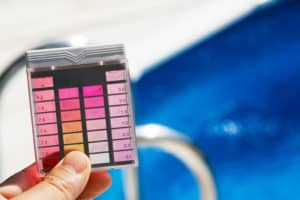Pool Care Questions Answered
Below, you will find answers to the most common pool care questions we’ve answered in the pool service business over our years. If you have pool care questions not answered below, let us know!
How long should I run my pool equipment?
We suggest your filter system runs 6 to 8 hours per day. When water temperatures climb above 80°, run the system 8 to 12 hours per day.
Do I need to drain my pool every year?
Keeping water in the pool during the winter can protect the bottom of the pool from cracking during freezing temperatures. However, we recommend a pool cover during the off-season to protect the pool from debris and cold temperatures.
To extend your swimming season, consider a pool heater.
How often should I test my pool water?
Test your pool water weekly to ensure chemicals are balanced.
How often do I need to clean my pool?
To protect your pool from algae and bacteria growth, you should clean your pool at least once a week. The walls and floor should be brushed and vacuumed to remove debris that the filter misses. Brushing is a must, even if you use an automatic pool cleaner or retain a weekly service.
How often do I need to clean my skimmer and pump baskets?
A dirty or clogged skimmer basket restricts water flow. If water can’t flow through your skimmer, your pool can’t circulate properly. The same is true of your pump basket. If water is restricted, the pump can overheat. Clean skimmer baskets daily and inspect for cracks, replacing if needed.
How often should I brush my pool?
You should brush the walls, ladders, steps, and corners of your pool at least once a week. Brush from the shallow end toward the deep end in overlapping strokes.
Why are pool chemicals necessary?
Pools tend to get dirty from the chemicals and skin cells of each swimmer who enters your pool. Plus, debris and other natural contaminants can also cloud the water and create a bacteria-infested environment.
Does my saltwater pool require any chlorine?
The nature of a saltwater system is that it converts ordinary salt into chlorine. There may be an occasion that you might need to super chlorinate the pool or “shock” the water.
How long should I wait to use my pool after a chemical shock treatment?
To stay on the safe side with chemical water treatments, we recommend waiting 8-12 hours after administering treatment. The best time to shock a pool is during the evening, to let the system run overnight. If you use a non-chlorine shock, you can swim within 30 minutes of the pool treatment.
What are the proper pH and alkaline balance for my pool water?
The pH level should be between 7.4 and 7.6, and the total alkalinity should be between 100 -150 ppm. For gunite pools, the calcium hardness should be between 200-250 ppm.
Why is it important for my pool chemical and water levels to be correct?
Keeping the proper levels in your pool allows for a safe and healthy swimming environment. If there aren’t enough chemicals in the water, it can create a haven for bacteria, creating unsanitary conditions. Too many chemicals can cause a harmful environment and dryness of skin, hair, and eyes.
Does a swimming pool need to be serviced year-round?
Yes, correctly maintaining your pool throughout the year will reduce the amount of staining. Pumps and other equipment should also be properly maintained to prolong their life. Regular maintenance will save you money in the long run.
What causes green pool water?
Imbalanced chemistry and filtration or circulation issues can lead to green pool water. Read more about green pool water and how to correct it.
What is pool automation?
An automated control system schedules and operates your filtration cycles, heating, lighting, sanitization, water features, and more with one-touch control. Premier Pool Services can install and service your automatic pool system.
Read more about pool automation here.
Can dogs swim in pools?
With proper care and safety measures in place, YES! Read more about allowing your dog in your pool here.
Get a FREE quote
Looking to build a brand new swimming pool or add a spa or water feature to your existing pool? Check out our fantastic pool designs at premierpoolsandspas.com.

